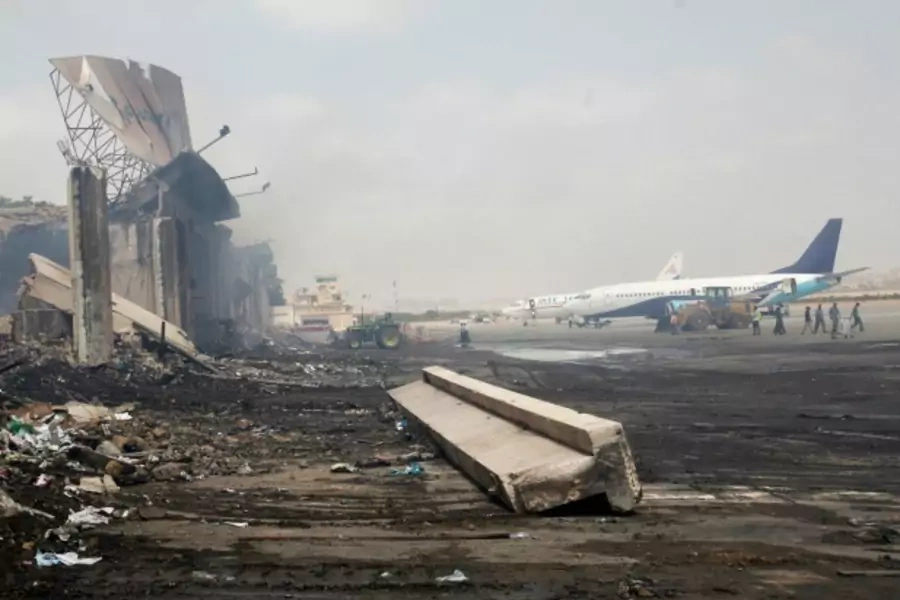Friday Asia Update: Top Five Stories for the Week of June 13, 2014

More on:
Ashlyn Anderson, Lauren Dickey, Darcie Draudt, Charles McClean, Will Piekos, and Sharone Tobias look at the top stories in Asia today.
1. After a six month suspension, CIA resumes drone strikes in Pakistan. Two U.S. drones struck Pakistan’s North Waziristan tribal region this week, killing several militants from Pakistani Taliban-allied factions, including the Haqqani network (which until recently held Sergeant Bowe Bergdahl hostage). The strikes came in the wake of the terrorist attack on the international airport in Karachi last Sunday; more than thirty people were killed including the militants. The Pakistani Taliban, or Tehrik-e-Taliban (TTP), claimed responsibility for the attack as retaliation for “the shelling and atrocities of the government.” Peace talks between the TTP and the Pakistani government have foundered and do not appear recoverable, and Pakistan is “mulling a new offensive of its own” against the militants. Although Pakistan has publicly condemned the U.S. drone strikes, anonymous government officials have admitted Islamabad gave the Americans “express approval” to carry out the strikes.
2. Japan, China exchange blame over jet encounter. For the second time since China established an Air Defense Identification Zone (ADIZ) in November 2013—which overlaps with Japan’s own ADIZ above the East China Sea—a Chinese fighter jet and Japanese Self-Defense Force aircraft flew within just 30 meters (100 feet) of each other. The encounter followed another close call on May 24 between Japanese and Chinese jets, and like the earlier incident both sides were quick to blame the other. Japanese defense minister Itsunori Onodera said it was the Chinese fighter jet who flew abnormally close, calling the action “extremely dangerous as it could have led to an accident.” In contrast, China’s Defense Ministry released what it says is video footage of the incident, blaming the Japanese pilot for flying too close and for “playing up the so-called ‘Chinese military threat’.” Onodera responded by asserting that the video showed Japanese Self-Defense Forces aircraft scrambling in accordance with international rules, and urged Japan and China to develop a maritime communication mechanism “in order to prevent accidents from escalating to be a serious clash.”
3. Beijing releases white paper on Hong Kong policy, starts protests. Mere days after tens of thousands of Hong Kong residents held a vigil to commemorate the twenty-fifth anniversary of the Tiananmen Square military crackdown, Beijing released a white paper reminding Hong Kong that it has “comprehensive jurisdiction over all local administrative regions, including the HKSAR [Hong Kong Special Administrative Region].” The white paper, issued by the Chinese State Council, also stressed that some “wrong views” exist in Hong Kong about political reforms. The white paper also reaffirmed Beijing’s promise to allow universal suffrage and direct election for Hong Kong’s leader in 2017, but residents are concerned that Beijing will only allow “patriots” to run. Hong Kong has retained a special status within China since it was ceased to be a British colony in 1997, and retains its own political system and some autonomy under the “One Country, Two Systems” policy. The Democratic Party of Hong Kong canceled a meeting with the mainland liaison office over the paper.
4. Trial of Sewol ferry crew begins in Gwangju, South Korea. The trial of the captain and fourteen crew members of the capsized Sewol ferry began on Tuesday in Gwangju, South Korea. The captain and three crew members face a potential death sentence, while eleven other crew members are being tried for lesser charges of criminal negligence and maritime law violations. The defendants argued that they could not control the number of passengers on the boat, which was decided in advance of the trip. The incident has sparked national outrage, leading to the examination and criticism of the national government’s capacity to react to such situations; indeed, to many this is a trial of Korean politics as much as the crew members. The search for the ferry owner Yoo Byung-un also continues; on Wednesday around 6,000 police officers raided a church compound partly owned by Yoo.
5. Myanmar proposes criminalization of interfaith marriage; U.S. has serious concerns. Amid rising sectarian tension in Myanmar, the country’s parliament is reviewing laws aimed at protecting the majority Buddhist identity by regulating religious conversations and interfaith marriages, banning polygamy, and curbing population growth. The U.S. Department of State voiced its serious concerns about the impact upon religious freedom; and the U.S. Commission on International Religious Freedom further noted that the proposed laws risk stoking violence against Muslims and other religious minorities. After meeting with activists, opposition leader Aung San Suu Kyi has said she will submit a report of recommendations to parliament. If the laws are passed, Washington will have to factor these developments into its evolving relationship with Myanmar.
Bonus: Thai military junta requires telecom companies provide World Cup coverage for free. Following a military coup last month, the new ruling junta has ordered telecommunications officials to air the World Cup for free in Thailand as part of a “happiness campaign.” Whether the campaign takes citizens’ minds off of their newly lost democratic freedoms remains to be seen.
More on:
 Online Store
Online Store